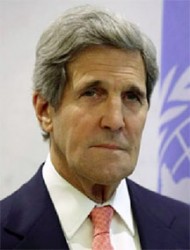JEDDAH, (Reuters) – The United States signed up Arab allies yesterday to a “coordinated military campaign” against Islamic State fighters, a major step in building regional support for President Barack Obama’s plan to strike both sides of the Syrian-Iraqi frontier.

After talks in Saudi Arabia’s summer capital Jeddah, Secretary of State John Kerry won backing from 10 Arab countries – Egypt, Iraq, Jordan, Lebanon and six Gulf states including rich rivals Saudi Arabia and Qatar – for a coalition to fight the Sunni militants that have seized swathes of Iraq and Syria.
“Arab nations play a critical role in that coalition, the leading role really across all lines of effort: military support, humanitarian aid, our work to stop the flow of illegal funds,” Kerry told a news conference.
Non-Arab Sunni power Turkey also attended the Jeddah talks but two other major regional players – Shi’ite Iran and Syria itself – were excluded, a sign of the difficulty of building a coalition across the Middle East’s sectarian battle lines.
The Arab states agreed in a communique to do more to stop the flow of funds and fighters to Islamic State and help rebuild communities “brutalised” by the group.
“The participating states agreed to do their share in the comprehensive fight against ISIL, including … as appropriate, joining in the many aspects of a coordinated military campaign against ISIL,” they said, using the acronym for Islamic State in Iraq and the Levant, a former name for the group.
Kerry met the Arab leaders to drum up support a day after Obama announced his plans to strike fighters in Iraq and Syria.
U.S. officials said Kerry also sought permission to make more use of bases in the region and fly more warplanes overhead, issues that were not mentioned in the communique. Kerry said none of the countries in the coalition would send ground troops.
In a hopeful sign of outreach across the sectarian divide that has spread war across the Middle East and fed Islamic State’s militancy, Sunni Saudi Arabia said it might open an embassy in Shi’ite-ruled Iraq after decades of suspicion.
The Saudis, who support other Sunni armed movements in Syria but consider Islamic State a terrorist group, have also promised to help Obama’s campaign by providing training camps for moderate Syrian Sunni fighters.
But Iran, the main Shi’ite power in the Middle East and supporter of Syria’s President Bashar al-Assad, said it had severe reservations over the new U.S.-led coalition, and doubted it would fight “the root causes of terrorism”, which it blames squarely on Sunni Arab states like Saudi Arabia.
Obama announced his plans in a prime time address on Wednesday to build an alliance to root out Islamic State in both Syria and Iraq, plunging the United States into two conflicts in which nearly every country in the Middle East has a stake.
The region has been galvanised since June when Islamic State fighters, already in control of much of Syria, swept through northern Iraq, seizing cities, slaughtering prisoners, and proclaiming a “caliphate” that would rule over all Muslims.
The White House says the group is a threat to the West as well, attracting fighters from around the world who could return to carry out attacks at home.
Islamic State is a Sunni group that embraces a radical vision of a Middle East ruled along 7th century precepts. Its fighters are battling a Shi’ite-led government in Iraq and a Syrian government led by Assad, a follower of an offshoot of Shi’ite Islam. They are also fighting against more moderate Sunnis in Syria and against Kurds on both side of the frontier.





